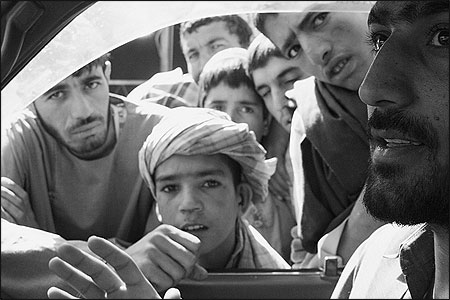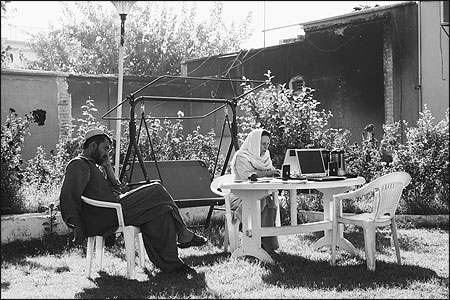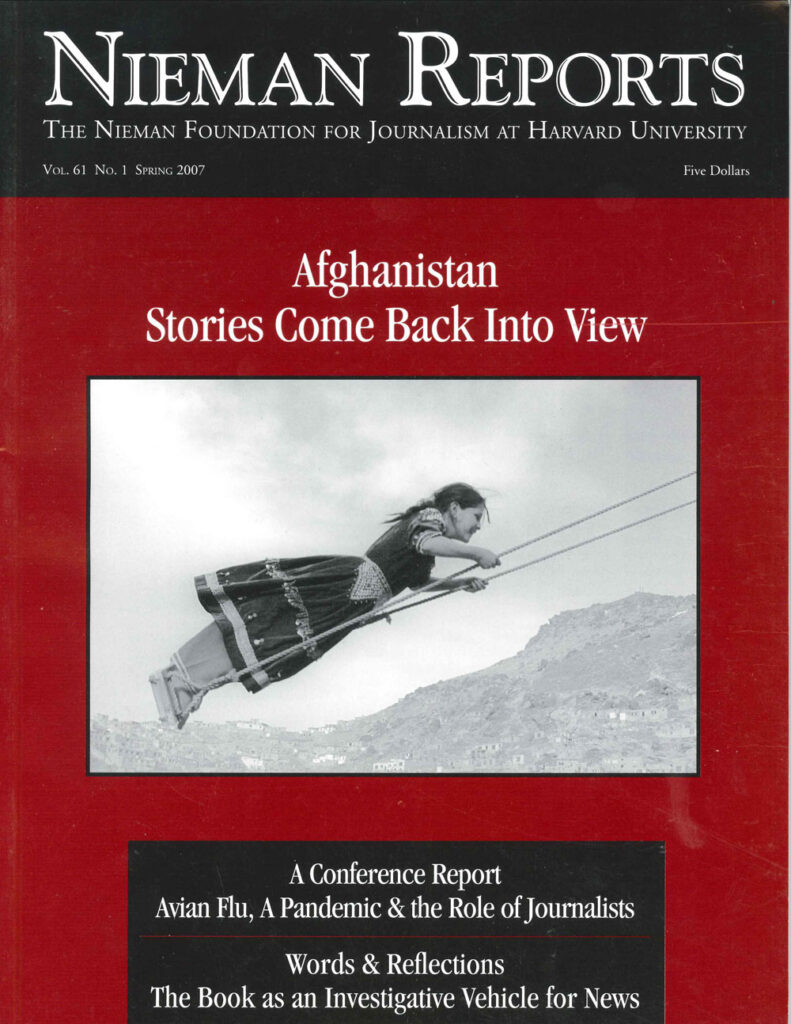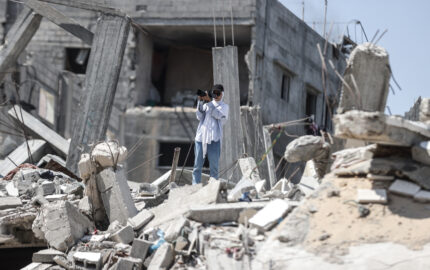
In the summer and fall of 2006, NATO's mostly Canadian and American troops, along with the Afghan National Army, fought major battles with Taliban fighters who poured into the countryside outside Kandahar City. Five years after the fall of the Taliban regime, the Taliban did something entirely unexpected: They took a stand. Their fighters — commonly thought to have crossed the border from Pakistan — attempted to take back the land along the shallow Arghandab River amid the mulberry orchards, vineyards, vegetable fields, and villages from which the movement sprang. Not surprisingly, in these conventional battles NATO troops beat back the Taliban, killing many and sending others into hiding. Renée Montagne, host of NPR's "Morning Edition," and Senior Producer Jim Wildman traveled to Kandahar in the fall of 2006 as part of a month-long stay in Afghanistan to report on how the country was doing five years after the defeat of the Taliban.
Kandahar in autumn is a place of clean blue skies, taming for now the jagged wild mountains below. The usual swirling brown dust is subdued, softening the edges of fields newly planted with poppy.
On this bright October day, I'm standing on the main street of a village that has been at the center of heavy fighting between the Taliban and NATO's Canadian and American troops. Through our translator, Qahir, we've been talking to villagers, elders and police, for a profile of Panjwai Bazaar — which, with this fragile calm, is back in business.
As we talk, a low rumble catches our attention. At the far end of the bazaar, out of a cloud of dust, emerges a lightly armored vehicle at the head of a convoy. It's worth mentioning here that my producer, Jim, is tall, blonde and wearing a neatly ironed shirt and khakis; I'm in a traditional long punjabi dress, but the white veil resting on my head and shoulders doesn't conceal my American face. As the first armored vehicle passes, the Canadian gunner, in helmet, full body armor, and his automatic weapon at the ready, spots us, and — waves.
We wave back. Slowly, like some small town parade, each gunner waves as he passes us by, until the last man calls out, halfway between sarcasm and surprise, "You don't stand out ...."
We joke that, actually, the convoy seemed from another planet.
This exchange also brings home to us what our translator Qahir hasn't forgotten for a minute — that Jim and I could not be more visible. And we're here — for the second time in a week — because Qahir has made the decision that we can all get in and out safely.
Even though Afghan National Army soldiers are billeted in the local high school; even though the district police station is at the top of the bazaar; even though stretching down the street are stalls newly stocked with goods, as Panjwai Bazaar serves hundreds of refugees who've abandoned villages farther out where fierce fighting goes on; still, this is a dangerous place.
Just a block away the burned-out shells of a string of stalls are reminders of a suicide bombing weeks earlier that killed two dozen Afghans. Having lost the battles, the Taliban have turned to guerrilla tactics — attacking with rockets, improvised explosives, and suicide bombers.
Foreign journalists, especially, should not tarry long. And it's Qahir who abruptly makes the call when the crowd gathered around us grows too big, too fast: "That's it, let's go."
More dangerous still is our 15-mile drive though the countryside as we come and go from Kandahar City. The Taliban's strict adherence to the "old" ways doesn't apply to their use of cell phones. Their fighters carry them and can easily alert their colleagues hiding up the road that a car carrying foreigners is headed their way. So Qahir presses the pedal to the floor on the trips we make to and from Panjwai and, as he put it, he watches "all my mirrors."
We place a lot of trust in the judgment of this 23 year old, who said he liked working with us partly for the adventure. At the same time, he goes home to a young wife and their two babies who live in a mud-brick compound filled with family he helps support, so his daring is leavened with a strong sense of responsibility.
As it turned out, he drew the line at taking us to the village of Pashmul, where Taliban were known to be walking around. Instead, he offered to go himself and report back what he found. He told us that he'd talked his best friend, Qassim, into going with him.
How did he do that? I wondered aloud.
Qahir laughed "I told him I didn't want to die alone!"
RELATED WEB LINK
Read a story by Jim Wildman about his and Montagne's work with translators » The page includes a link to a conversation Montagne had with Qassim and Qahir about why they risk their lives to help journalists tell the stories of Afghanistan.During our time together, Qahir and Qassim regularly made fun of the Taliban and of their lives under Taliban rule. They told us of the day Qahir once spent in a jail because his beard was deemed to be "insufficiently long." He was freed only when his Taliban jailer figured out Qahir was too young to grow a full beard. And there was the time Qahir called one of his friends and warned him in a deep voice, "I know you work for foreigners and you must stop or we'll kill you ...." His friend was still in a panic when they arrived that night to let him in on the joke.
So I was surprised when the two of them arrived back from Pashmul genuinely shaken.
As they drove into this Taliban stronghold, they realized that their cell phones could give them away. Hurriedly, they erased many valuable numbers, including local contacts, nongovernmental organizations, and journalists.
Qahir explained to us what would happen if the Taliban took his cell phone.
"'How many relatives do you have?' the Taliban would ask," Qahir explained. "Then he might hit redial, and ask whoever answered 'Who does your friend work for?' and that person might tell him. If he found out I worked for foreigners" — here Qahir ran his finger across his neck — "no more questions, I'm slaughtered." He paused, and then broke out in a big smile.
I have my theories as to why every one of our several translators in Afghanistan has possessed a keen wit, a ready laugh, and a way with telling a story. It is perhaps because they're young. Or perhaps because they come from 3,000 years of history during which waves of invaders have honed into the culture a fine sense of observation and irony. Or perhaps these young men — born into 25 years of war and loss — knew few other stories, knew no other games.
RELATED WEB LINK
View links to the series of stories done by Renée Montagne and Jim Wildman during their one-month reporting trip to Afghanistan »This thought struck me one afternoon in Kabul, as our translator Najib led us up one of the hills that ring the city. We were searching for the exact spot where the first bombs had fallen in the American-led invasion in 2001. We needed this location to begin our first piece on the fifth anniversary of that war. Najib entertained us by imitating the sounds of the rockets from an earlier war: the deadly fight among the mujahideen for control over the capital, after the Soviets departed; it had been a four-year civil war that ended in 1996 with the arrival of the Taliban.
"Bum ... bum ... boooo bu-bu-bu-bum ....!"
That's how the rockets of the vicious warlord Hekmatyar (once funded, now hunted, by the United States) sounded as they took off. Back in 1992, an adolescent Najib and his young friends memorized the distinct sounds of the bombs and rockets that rained down on the city, delivered by fighters led by men such as Ahmad Shah Massoud, Burhanuddin Rabbani, Abdul Rashid Dostum.
"Hekmatyar's started with a weak sound, then the boom as they were coming," Najib said, as he began the long whistle of a tea kettle. "SSSSSSSHHH .... Bummmm, BUM ... BOOM!"
Rockets once fell next to Najib's house, killing several children. Other friends, at other times, were wounded. "We were scared sometimes, but when we got together we were having fun with the sounds, and 'doing' each warlord's rockets to perfection."
Five years earlier, I'd trekked up a different hill with our translator Zalmai, who'd studied geology, but was a poet at heart. We'd come to see the hilltop tomb of the Shah's family, now crumbling and pockmarked. A graveyard stretched alongside the tomb. Faded ribbons waved from the wooden markers of neglected graves. Zalmai told us of an expression that had come into vogue during the civil war — a time when hundreds of people were killed some weeks in Kabul, a story that rarely made the papers elsewhere.
A crowd, any crowd, came to be measured as "a graveyard of people."
Now I wanted to know how Najib might use this expression.
"Say I've gone out to fetch my friends some hamburgers," Najib replied (putting it in American terms, though there is an ice cream and hamburger hangout in Kabul). "And there are lots of people ahead of me in line. When I get back, I might say: Sorry it took so long, but there was a graveyard of people there."
Then he added, "So while we eat our hamburgers, we might tell each other about some of the things that happened to us during the war.
"And laugh."




